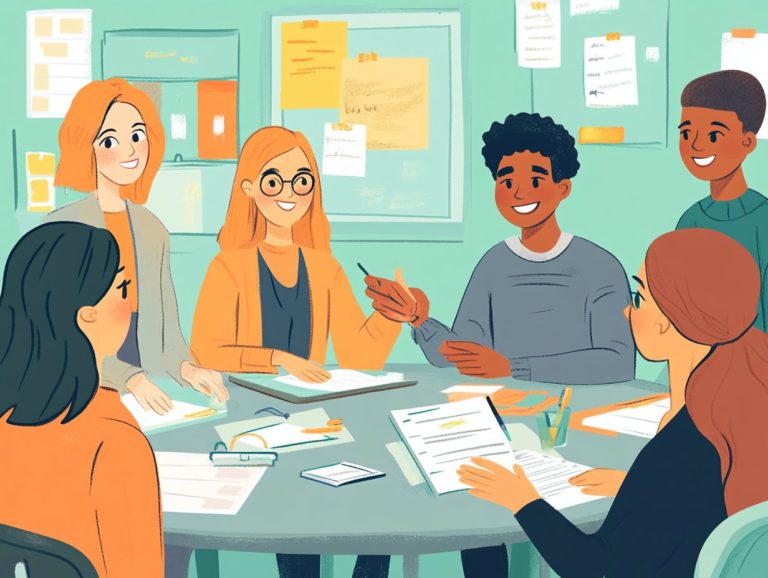5 Ways to Promote Skill Development in Your Team
In today s fast-paced work environment, cultivating skill development within your team is essential for achieving success.
This article delves into five effective strategies to enhance your team’s capabilities. It guides you through identifying skill gaps and providing ongoing feedback and recognition.
You will explore the significance of continuous learning, the various skill sets that can be developed, and the challenges leaders encounter in promoting growth.
You ll also learn how to measure the impact of these initiatives.
Are you ready to elevate your team s potential? Let s dive in!
Contents
- Key Takeaways:
- 1. Identify Skill Gaps in Your Team
- 2. Offer Training and Development Opportunities
- 3. Promote Teamwork and Skill Sharing
- 4. Provide Regular Feedback and Coaching
- 5. Recognize and Reward Progress and Improvement
- Why Is Skill Development Important in a Team?
- What Are the Different Types of Skills That Can Be Developed?
- How Can a Team Benefit from Skill Development?
- What Are the Challenges in Promoting Skill Development in a Team?
- How Can a Leader Create a Culture of Continuous Learning and Development?
- What Are Some Effective Strategies for Measuring the Success of Skill Development in a Team?
- Frequently Asked Questions
- What are some effective ways to promote skill development in your team?
- Why is it important to promote skill development in your team?
- How can I identify the skills that need to be developed within my team?
- What are some budget-friendly ways to promote skill development in my team?
- How can I measure the success of skill development in my team?
- What should I do if an employee resists training opportunities?
Key Takeaways:

- Identify skill gaps in your team to understand areas for improvement.
- Offer training and development opportunities to enhance skills and knowledge.
- Encourage cross-training and collaboration to foster a well-rounded team.
1. Identify Skill Gaps in Your Team
Identifying skill gaps in your team is an important step for any organization dedicated to employee development. It sets the groundwork for personalized training programs designed to promote professional growth and elevate the overall workplace culture.
Recognizing these gaps requires a comprehensive skill assessment to uncover the areas where your employees need upskilling or reskilling to tackle both present and future challenges.
You have various methods to conduct these assessments effectively. Performance evaluations give you a clear snapshot of individual contributions. Meanwhile, employee surveys can gather broader perspectives on perceived gaps throughout the team.
One-on-one meetings provide a valuable chance for open discussions, allowing employees to voice their development needs directly. It s crucial to foster a culture of engagement where employees feel enabled to take ownership of their growth.
By following this approach, you not only pinpoint areas for improvement but also cultivate a motivated workforce eager to collaborate and innovate. This ultimately drives the success of your team.
2. Offer Training and Development Opportunities
Put employee development first to boost workplace satisfaction now. By offering a range of training and development opportunities tailored to individual career aspirations, organizations foster a culture of continuous commitment and skill enhancement.
These training programs can vary from technical skill development to leadership initiatives. Workshops provide hands-on experience and allow you to engage directly with the material.
Coaching sessions, on the other hand, offer personalized guidance that targets your specific challenges and career goals. Mentorship programs further enrich this experience by pairing you with seasoned professionals who can share invaluable insights.
Integrating personalized development plans is essential. These plans are crafted to meet your unique needs, ensuring you receive the support and resources necessary for your growth.
Such tailored approaches benefit you and align with the organization’s objectives, ultimately driving both morale and productivity.
3. Promote Teamwork and Skill Sharing
Encouraging cross-training and collaboration within your teams does wonders for employee engagement and nurtures those all-important adaptability skills.
By immersing team members in diverse roles within the organization, you pave the way for heightened productivity and enhanced team effectiveness. This practice creates networking opportunities and serves as a significant catalyst for organizational success.
As you engage in cross-functional projects, your employees gain valuable insights into the challenges and goals of their colleagues, which strengthens communication across departments.
For example, a marketing team collaborating closely with product development can lead to campaigns that genuinely resonate with customer needs.
This collaborative approach fosters creative problem-solving, as a variety of perspectives often yield innovative solutions. When teams share knowledge and best practices, you cultivate a culture of continuous improvement that drives overall performance.
This ensures your organization remains agile in a competitive landscape.
4. Provide Regular Feedback and Coaching

Regular feedback and coaching are crucial for improving performance. This practice fosters a culture of professional growth.
Timely feedback acts as a powerful tool for recognizing achievements. Structured coaching sessions provide the guidance necessary for skill development.
By setting clear expectations and offering actionable insights, you ensure that employees feel valued and enabled. This approach enhances individual performance and cultivates a sense of belonging within the organization.
Maintaining open lines of communication and encouraging continuous dialogue allows you to assess progress and challenges effectively. This ultimately leads to higher job satisfaction and retention rates among your team members.
5. Recognize and Reward Progress and Improvement
Recognizing and rewarding progress boosts employee satisfaction and loyalty. It shows your commitment to their development.
You can explore various recognition methods, such as peer-to-peer programs, performance bonuses, or public acknowledgment during team meetings. These can significantly elevate morale.
The effects of such acknowledgments go beyond applause; they cultivate a profound sense of belonging and significance within your workforce.
When employees feel appreciated, their engagement levels soar! This leads to elevated productivity and better overall organizational performance. Retaining talented individuals becomes easier when they recognize that their efforts are genuinely valued, fostering loyalty and minimizing turnover rates.
Why Is Skill Development Important in a Team?
Skill development is vital for teamwork. It improves collaboration and engagement, helping teams tackle challenges effectively.
Investing in continuous skill enhancement leads to improved performance and greater adaptability. This contributes significantly to business continuity.
This proactive approach nurtures a culture of open communication. Team members can comfortably share ideas and feedback.
As individuals learn to address challenges, enhanced problem-solving abilities emerge, facilitating smoother workflows and quicker resolutions.
Not only does this boost overall productivity, but it also fosters a sense of accountability and enablement among employees. Organizations prioritizing skill development often see a direct link between a skilled workforce and the successful achievement of strategic objectives, making it a savvy investment for long-term growth.
What Are the Different Types of Skills That Can Be Developed?
You have the opportunity to cultivate a diverse array of skills, which can be categorized into soft skills, hard skills (specific knowledge and abilities), and technical skills each essential for effectively navigating the complexities of today s workplace.
Soft skills, such as communication and problem-solving, are becoming increasingly valuable alongside hard skills, as they significantly enhance team dynamics and overall workplace satisfaction.
Technical skills like data analysis and programming are critical, particularly in technology-driven industries, where they boost efficiency and productivity. Interpersonal skills, including teamwork and conflict resolution, help create a cohesive work environment, fostering collaboration and innovation.
Leadership skills serve as a powerful tool, enabling you to take initiative and drive projects while paving the way for career advancement. Each of these skill categories plays a vital role in ensuring that you not only excel in your current role but also position yourself for future opportunities within the organization.
How Can a Team Benefit from Skill Development?

A team can reap substantial rewards from skill development, leading to enhanced effectiveness, improved employee engagement, and significant productivity gains through superior communication and collaboration.
By cultivating a diverse skill set within the team, each individual can contribute more meaningfully to shared goals, resulting in an overall uplift in team performance and job satisfaction.
Consider how team members who engage in training sessions focused on effective communication techniques become adept at articulating their thoughts and actively listening to feedback. This newfound clarity can reduce misunderstandings during collaborative projects, ultimately fostering a more positive work environment.
Skills that boost problem-solving abilities empower the team to tackle challenges head-on! For instance, a project team trained in critical thinking might tackle a tight deadline by brainstorming innovative solutions together, maximizing both their resources and individual strengths.
These collective efforts not only elevate morale but also ensure that projects are completed with greater success.
What Are the Challenges in Promoting Skill Development in a Team?
Facing challenges in promoting skill development? You re not alone! Promoting skill enhancement within your team can certainly present hurdles, such as tackling existing skills gaps, keeping employee motivation high, and dealing with constant time pressures that often impede developmental initiatives.
It s essential to recognize that strong organizational support plays a critical role in fostering a learning culture that genuinely encourages employees to enhance their skills.
You may find that limited budgets and resources are common obstacles, making it tough to implement comprehensive training programs that meet the diverse needs of your workforce.
To address these challenges, consider encouraging a mix of formal and informal learning opportunities. Mentorship programs and online courses, for instance, allow employees to learn at their own pace and fit development into their busy schedules.
Establishing clear pathways for career advancement based on skill development can significantly elevate motivation levels. Moreover, creating a safe and open environment where team members feel comfortable sharing their learning experiences is vital for cultivating a thriving culture of growth.
How Can a Leader Create a Culture of Continuous Learning and Development?
Leaders hold a pivotal position in cultivating a culture of continuous learning and development. This culture encourages you to pursue professional growth through initiatives like mentorship programs and training opportunities.
By nurturing an environment that values ongoing learning, leaders enhance your engagement and drive organizational success.
To effectively instill this culture, leadership should set clear expectations while embodying the values of learning themselves. When they demonstrate commitment by participating in training and sharing their personal development stories, it can truly inspire you and your colleagues. Your growth is vital!
Access to diverse resources, including online courses and learning platforms, is essential for enabling you to take charge of your own progress. Establishing open channels for communication and support allows you to seek help and collaborate, leading to a more dynamic and motivated workforce.
Ultimately, prioritizing continuous learning shows a leader’s dedication to your personal and professional ambitions, fostering an atmosphere of trust and innovation.
What Are Some Effective Strategies for Measuring the Success of Skill Development in a Team?
Measuring the success of skill development within your team calls for a strategic approach. You ll want to use performance reviews, skill assessments, and gather employee feedback to effectively gauge progress.
By leveraging these metrics, you can understand how your training programs are impacting your team and make necessary adjustments to enhance both collaboration and overall performance.
Implement regular check-ins and one-on-one discussions to assess individual progress and identify obstacles your team members might encounter. Surveys can also serve as valuable tools for collecting feedback on specific training techniques and resources, helping you pinpoint strengths and areas for improvement.
Combining qualitative insights with quantitative data creates a comprehensive view of effectiveness that enables you to pivot your training initiatives as needed. This ongoing cycle of assessment, feedback, and adjustments ensures that your skill development efforts remain closely aligned with both team goals and broader organizational objectives.
Frequently Asked Questions

What are some effective ways to promote skill development in your team?
1. Encourage continuous learning and growth by providing access to training and development opportunities.
2. Offer constructive feedback and recognition for improvement and progress.
3. Facilitate regular knowledge-sharing sessions where team members can learn from each other.
4. Implement mentorship programs to pair experienced employees with those looking to develop certain skills.
5. Allow team members to take on new and challenging tasks to expand their skill set.
Why is it important to promote skill development in your team?
Promoting skill development leads to increased productivity, improved job satisfaction, and a more competitive, adaptable workforce. It also shows that you value and invest in your employees’ growth, leading to better retention rates and a positive work culture.
How can I identify the skills that need to be developed within my team?
Start by conducting a skills assessment or survey to identify the current skills and knowledge of your team. Solicit feedback from employees and their superiors to pinpoint areas for improvement.
What are some budget-friendly ways to promote skill development in my team?
Consider offering online courses, workshops, or lunch-and-learn sessions. Use free resources, such as webinars, podcasts, and articles. Don’t forget to utilize internal resources and expertise within your team by organizing knowledge-sharing sessions or creating mentorship programs.
How can I measure the success of skill development in my team?
Set clear and measurable goals for each training program. Track progress and gather feedback to see how effective the programs are.
Compare team members’ performance before and after the training to gauge improvement.
What should I do if an employee resists training opportunities?
Find out why they are hesitant it can lead to a breakthrough! Explain how training can boost their personal and professional growth.
If the resistance continues, consider offering different options or discussing it with their manager.






